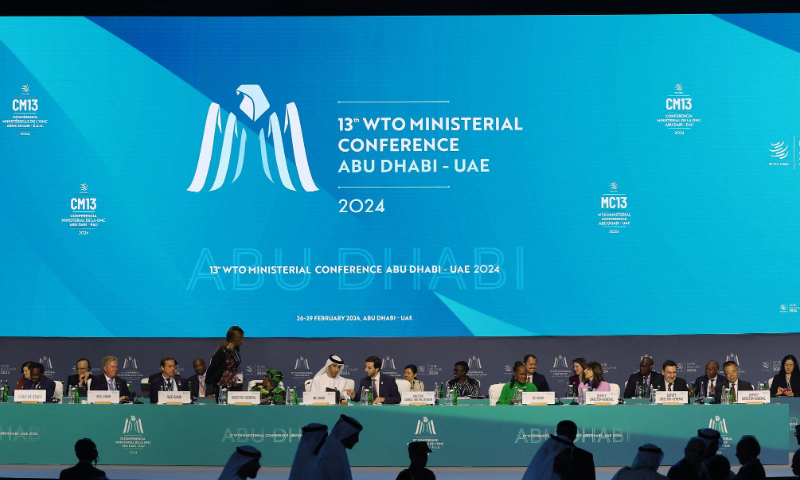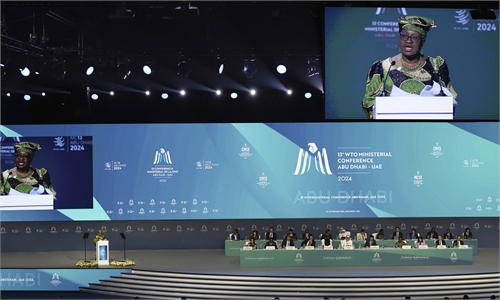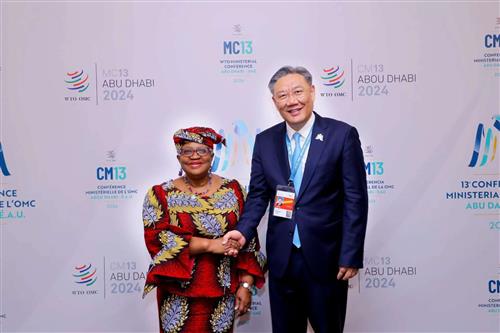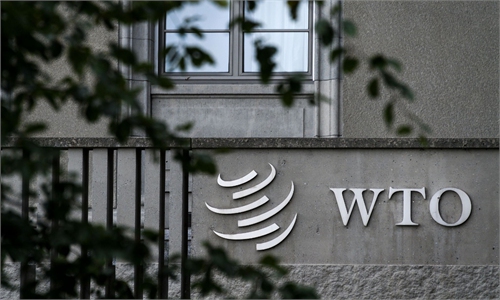
Delegates attend the 13th WTO Ministerial Conference in Abu Dhabi on February 26, 2024. Photo: VCG
Good news came on Tuesday from the 13th Ministerial Conference of the World Trade Organization (WTO) being held in Abu Dhabi. New disciplines on good regulatory practice for services trade will enter into force. The new rules apply to over 70 signatories of the Reference Paper on Services Domestic Regulation, including China, the US and the EU. The rules will reduce the procedural obstacles faced by enterprises and save $127 billion in annual global services trade costs. This is a major achievement in services trade since the establishment of the WTO, and it will also help boost morale and confidence in WTO negotiations and reform.
The service industry plays an important role in today's world economy, creating more than one-third of global GDP, absorbing more than two-thirds of the world's foreign direct investment, and providing nearly two-thirds of employment opportunities in developing countries. In developed countries, four-fifths of the jobs have been created by the service industry. The service industry is also profoundly changing the manufacturing industry. Today, the design, research and development, intellectual property rights, logistics, delivery and distribution of a high value-added industrial product must rely on the high-quality service industry. In international trade, the competitiveness of products depends to a large extent on the quality and effectiveness of services.
On the one hand, the service industry is crucial to the global economy, which means that it is the best way for countries to achieve win-win cooperation through consultation by opening up the service industry market; on the other hand, the service industry is an area with serious barriers - it is far less free and convenient internationally than trade in goods. Due to many reasons, consultations on services trade have always been difficult within the WTO framework. Of course, the harder it is to negotiate, the more necessary it is. The high costs caused by the existence of barriers to services trade have caused widespread damage to the interests of countries around the world. The deadlock can only be broken by breaking down barriers through multilateral cooperation.
The negotiation and consultation on trade in services rules within the WTO have been delayed for many years. Prior to the convening of this ministerial-level meeting, there was little public anticipation that the new rules could be passed. Even after the rules were approved, EU trade commissioner Valdis Dombrovskis admitted that reaching this outcome "has not been an easy pass." The new rules faced opposition from two WTO members, but a "spirit of compromise" eventually cleared hurdles, he said. It should be noted that the twists and turns in the process are not contradictory to the smooth achievement of results. A rule reached through thorough negotiation and coordination is in line with the spirit of multilateralism, balances and accommodates the interests of all parties, thus ensuring comprehensive and enduring rules.
This achievement is also a victory for the WTO. Previously, certain major countries attacked the so-called "inefficiency" of the WTO, threatened to withdraw from the WTO, and obstructed the appointment of judges for the WTO Appellate Body. In plain terms, they found fault with the principle of consensus among WTO members, which hindered their attempt to establish a "unilateral dominance" under their own terms. The negative impact caused by these actions on the normal order of the WTO and world trade cannot be underestimated.
Some Western opinions were already rushing to conclusions even before the start of this WTO conference. They believed that against the backdrop of increasing geopolitical and economic divisions, this WTO conference is unlikely to achieve any results. Certain major countries are also shifting the blame onto China, portraying China as the "greatest challenge to the international trading system." Creating a crisis out of thin air and then attributing the responsibility for this crisis to China has become a common tactic in the West. However, facts prove that rejecting cooperation within the WTO framework under the pretext of so-called "inefficiency" is not valid, and China is not an obstacle to the WTO agenda. On the contrary, as the world's largest exporter of goods and the third-largest exporter of services, any WTO agenda cannot be successfully passed without China's active participation.
It is also necessary to see that the new rules for trade in services are not the main agenda of this WTO meeting. The implementation of these new rules is just the first step in building a more just, transparent, and efficient global trade in services environment. There are still many tough challenges to face in the future. According to some Australian media comments, the WTO is heading toward a "battle worth fighting," and most of the major members arrive with their own agenda and interests, leading to the results that "negotiations are often slow, and outcomes are lowest common denominator." To break this curse, it is necessary to reform the mechanisms of the WTO to make them more rational. It is equally important for countries to bridge their differences, build consensus, and work together as a foundation and driving force.
During this ministerial-level meeting, the WTO welcomed two new members, Comoros and Timor-Leste. The highly anticipated "Fisheries Subsidies Agreement" also gained acceptance from an increasing number of countries, which is good news. The world economy thrives when open and declines when closed. Safeguarding the hard-won free trade and multilateral trading system requires global joint efforts. Looking back, it will be realized that the development of world trade is a process of advancing in waves and rising in a spiral, and it will not stop due to obstacles encountered along the way.



